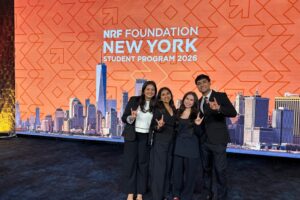AUSTIN, Texas — The School of Architecture at The University of Texas at Austin will address one of the most pressing issues affecting 21st-century design and planning by establishing a new program on race, gender and the American built environment. The effort aims to facilitate diversity among design and planning professionals and students, and foster innovation in teaching and research on race, gender and inequality in American cities.
Partially funded by the university’s Division of Diversity and Community Engagement, the initiative will ensure that the School of Architecture is on the leading edge of scholarship and practice regarding these important issues.
Anna Brand and Andrea Roberts have been appointed as the program’s first emerging scholar fellows. They will teach courses related to race, urban development and cultural landscape.
“The addition of Anna Brand and Andrea Roberts to our faculty underscores the School of Architecture’s commitment to addressing race and gender disparity within the design field in a new and meaningful way,” said Elizabeth Danze, interim dean for the School of Architecture. “We are grateful to the University of Texas’ Division of Diversity and Community Engagement for their support of this initiative, and we look forward to furthering understanding of these important concerns through new courses, research and scholarship.”
“The Division of Diversity and Community Engagement proudly supports the appointments of Professors Anna Brand and Andrea Roberts,” said Dr. Gregory J. Vincent, vice president for diversity and community engagement. “We applaud the work of the School of Architecture as they focus on the intersection of race, gender and inequality in urban areas. There is great need for further study as the access and equity in our cities for those in the greatest need becomes more difficult by the day. We look forward to the community-based research that is to come.”
Cities are complex built environments that integrate the physical, natural and social worlds of human settlement. A strength of urban living is diversity, which has many dimensions including race, gender, experience and opportunity.
The innovative power of cities, in the form of knowledge-generation and the discovery of new solutions to address our most pressing needs and challenges, is rooted in the presence of and engagement between residents with diverse experiences and know-how. At the same time, the legacy of slavery and a prolonged history of social segregation, including the economic and political disenfranchisement of minorities, continue to undermine the power of urban diversity.
Although much has been done to address the negative aspects of this legacy, more needs to be done to make U.S. cities more equitable, healthy, fair, safe and beautiful. With this initiative, UT Austin establishes its commitment to further scholarship in this area and instill in the next generation of designers and planners the importance and power of diversification.
During their one-year appointment, Brand and Roberts will engage in new research and teach classroom and studio courses with a focus on critical topics associated with race and gender in the built environment in U.S. cities. They will engage with scholars across the UT campus in programs and departments including American Studies, African and African Diaspora Studies, Women and Gender Studies, and the Institute for Urban Policy Research & Analysis.
Anna Livia Brand comes to the school from the Department of Planning and Urban Studies at the University of New Orleans. Her research focuses on the historical development of and contemporary planning and design challenges in black mecca neighborhoods in the American North and South, including Chicago’s Bronzeville; New York’s Harlem; Washington, D.C.’s, Shaw; New Orleans’s Treme; Atlanta’s Sweet Auburn; and Houston’s Third and Forth Wards. She investigates and compares how the redevelopment of the historical business and cultural corridors in these communities reflects ongoing racialization and changing commitments to equity and social justice for those who have traditionally suffered under urban revitalization policies. For the spring 2017 semester, she will lead a course on race and urban development that draws on urban planning, critical race theory, and black feminist theory and scholarship.
Andrea Roberts graduated with her doctorate from the UT School of Architecture’s Community and Regional Planning and Historic Preservation Programs. She is founder of the Texas Freedom Colonies Project, a research and social justice initiative dedicated to recording settlement origin stories and African American contributions to planning history and practice. Her transdisciplinary, participatory action research focuses on cultural agency, identity, African diaspora theory, intangible heritage, and grass-roots planning and development. While pursuing her doctorate, Roberts participated in the City of Austin’s Historical Wiki Project, a crowdsourcing architectural survey application. In 2012, she created and served as project manager for The Fifth Street Project, a community-based planning initiative and market study conducted under the auspices of the Center for Sustainable Development at UT Austin. Her course next spring, Cultural Landscape & Ethnographic Methods, will investigate sustainable approaches to recognizing and protecting vernacular, gendered and racialized places.



